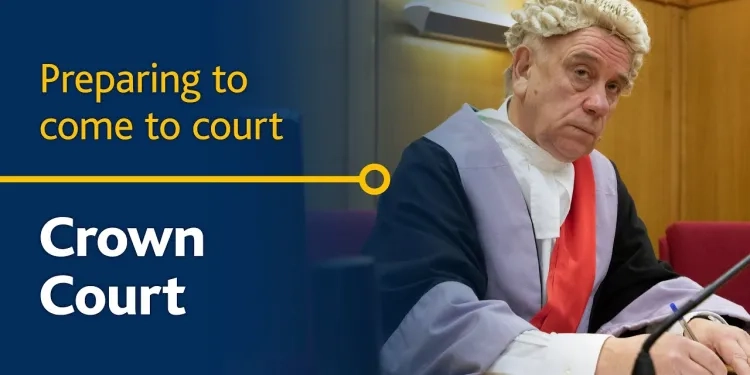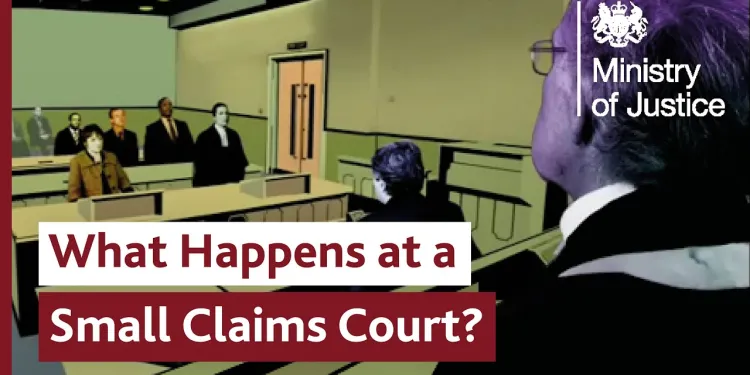Find Help
More Items From Ergsy search
-

The Family Court without a Lawyer
Relevance: 100%
-

The Family Court without a Lawyer - Video 1 of 3
Relevance: 97%
-

The Family Court without a Lawyer - Video 2 of 3
Relevance: 96%
-

The Family Court without a Lawyer - Video 3 of 3
Relevance: 96%
-

What are the changes to Family Court Law in 2026?
Relevance: 91%
-

Magistrates in the Family Court: A Public Law Case
Relevance: 91%
-

Magistrates in the Family Court: A Private Law Case
Relevance: 91%
-

How To Prove Narcissistic Abuse In Family Court UK
Relevance: 88%
-

How to represent yourself in family court in England and Wales
Relevance: 88%
-

Are there modifications to legal aid access in family court for 2026?
Relevance: 84%
-

What digital services have been introduced in family courts in 2026?
Relevance: 83%
-

What are the new protocols for domestic violence cases in family court in 2026?
Relevance: 80%
-

Have the rules for changing a child's name in family court changed in 2026?
Relevance: 77%
-

Have the rights of same-sex couples been affected by the 2026 family court changes?
Relevance: 76%
-

What is the status of joint custody provisions in the 2026 family court updates?
Relevance: 73%
-

How have prenup agreements been affected by the 2026 family court changes?
Relevance: 73%
-

Are there any changes to surrogacy arrangements under the 2026 family court law?
Relevance: 73%
-

How are parental rights addressed differently in the 2026 family court updates?
Relevance: 72%
-

Court of Protection
Relevance: 68%
-

What are the key changes to family court law in 2026?
Relevance: 67%
-

Crown Court - Preparing to come to court
Relevance: 66%
-

The Crown Court
Relevance: 65%
-

How do court holidays affect the timeline for a case to come to court?
Relevance: 62%
-

How does the type of case impact the court schedule?
Relevance: 61%
-

Child Care Proceedings | Family Law
Relevance: 60%
-

What Happens at Small Claims Court? Making a Court Claim for Money
Relevance: 59%
-

Does the location of the court affect case timing?
Relevance: 59%
-

How long does it take for a case to come to court?
Relevance: 57%
-

Why might a court date be delayed?
Relevance: 56%
-

Is there a standard minimum or maximum time for a case to reach court?
Relevance: 54%
-

Can the Attorney General override a court decision?
Relevance: 53%
-

Impacts of Recent Changes to Family Law Legislation
Relevance: 53%
-

What steps can a party take to expedite a court date?
Relevance: 53%
-

Can I appeal a court's eviction decision?
Relevance: 53%
-

What factors affect the time it takes for a case to come to court?
Relevance: 52%
-

How quickly can a criminal case come to court?
Relevance: 52%
-

Navigating Changes in Family Law Post-Brexit
Relevance: 51%
-

How can I prepare for an eviction court hearing?
Relevance: 51%
-

How does the availability of judges affect the timing of a case coming to court?
Relevance: 51%
-

Navigating Post-Brexit Family Law Changes
Relevance: 51%
The Family Court without a Lawyer - Video 2 of 3
Introduction to Representing Yourself
Representing yourself in the Family Court can be a daunting experience. However, many individuals choose to manage their cases without a lawyer, often due to the high costs of legal representation. This video is the second in a three-part series aimed at helping people navigate the Family Court system in the United Kingdom on their own. Understanding the process, knowing what to expect, and being well-prepared can significantly impact your experience and outcomes in court.Understanding Court Procedures
One of the key aspects of self-representation is understanding the Family Court process. The Family Court deals with issues such as divorce, child custody, and financial disputes. In the UK, the procedure typically involves several hearings, including First Hearing Dispute Resolution Appointment (FHDRA), Dispute Resolution Appointments (DRAs), and the Final Hearing. Each phase has specific objectives and requirements, making it crucial to know what is expected at each stage. Ensuring your documents are prepared and submitted on time can prevent unnecessary delays.Effective Preparation and Presentation
Effective preparation is vital for anyone representing themselves. Begin by gathering all necessary documents, including financial records, witness statements, and evidence that supports your case. Organize these documents in a coherent manner. When presenting your case, clear and concise communication is essential. Practice articulating your points confidently and respectfully, focusing on the facts rather than emotions. Remember, the judge's role is to remain impartial, so providing clear, factual information can significantly bolster your case.Utilizing Available Resources
Many resources are available to help self-represented individuals. Citizens Advice Bureau, online legal forums, and self-help guides offer valuable information regarding Family Court procedures and legal jargon. Additionally, McKenzie Friends, who are non-lawyers, can provide moral support and guidance in court. Though they cannot speak on your behalf, they can offer suggestions and help you stay organized. Leveraging these resources can make the process more manageable and less stressful.The Importance of Staying Calm
Finally, maintaining a calm and composed demeanor throughout court proceedings is imperative. The court setting can be stressful, but staying calm helps you think more clearly and present your case more effectively. Take deep breaths, focus on the issues at hand, and remember that the court is interested in resolving the matter as fairly and efficiently as possible. Your ability to remain composed can influence the court's perception of you and potentially the outcome of your case. By understanding these points, individuals who choose to represent themselves in the Family Court can better navigate the complexities of the legal system in the United Kingdom.The Family Court without a Lawyer - Video 2 of 3
Introduction to Representing Yourself
Going to the Family Court without a lawyer can feel scary. But many people do it on their own because lawyers can be expensive. This is the second video out of three that helps people understand how to handle the Family Court in the UK. Knowing what happens, what to expect, and getting ready can help you a lot in court.Understanding Court Procedures
It is important to know how Family Court works if you're representing yourself. Family Court helps with things like divorce, custody of children, and money arguments. In the UK, there are different parts to each case — like First Hearing Dispute Resolution Appointment (FHDRA), Dispute Resolution Appointments (DRAs), and the Final Hearing. Each part has different things you need to do, so it's important to know what to bring to each one. Always get your papers ready and submit them on time to avoid delays.Effective Preparation and Presentation
Getting ready is very important when you're on your own. Start by collecting all needed papers like money records, statements from people, and any evidence to help your case. Keep these papers tidy. When you talk about your case, keep it simple and clear. Practice speaking about your points with confidence and be polite. Focus on the facts, not your feelings. Remember, the judge is fair, so giving clear facts can really help your case.Utilizing Available Resources
There are lots of resources to help you. The Citizens Advice Bureau, online legal groups, and books can teach you about Family Court and legal words. A McKenzie Friend, who is not a lawyer, can support you in court. They can't talk for you, but they can give advice and help you stay calm. Using these tools can make court less confusing and less stressful.The Importance of Staying Calm
It's very important to stay calm in court. Court can be stressful, but being calm helps you think better and talk about your case well. Breathe deeply, focus on the main issues, and remember the court wants to solve things fairly. Staying calm can make the court see you better and might help your case end well. By knowing these things, people who decide to represent themselves in Family Court can better understand and handle the legal process in the UK.Frequently Asked Questions
What is Family Court?
Family Court is a legal body in the UK that deals with disputes and issues related to family matters, such as divorce, child custody, and financial settlements.
How can I represent myself in Family Court?
You can represent yourself in Family Court, also known as being a litigant in person, by preparing your case, filing the necessary documents, and presenting your argument in court without a lawyer.
What types of cases does Family Court handle?
Family Court handles cases involving divorce, child arrangement orders, spousal maintenance, domestic violence protection orders, and other family-related issues.
Do I need to attend Mediation Information and Assessment Meeting (MIAM) before going to Family Court?
In most cases, you are required to attend a MIAM before applying to the Family Court. This meeting helps determine whether mediation could resolve the issue without going to court.
How do I apply for a child arrangement order?
You must complete and submit a C100 form to the Family Court, along with a £215 fee, unless you qualify for a fee exemption or reduction.
What is a C100 form?
A C100 form is a legal document used to apply for a child arrangements order, prohibited steps order, or specific issue order in Family Court.
How do I prepare for a court hearing?
Preparing for a court hearing involves gathering all relevant documents, preparing witness statements, understanding the court process, and practising how you will present your case.
What should I bring to the court hearing?
Bring all relevant documents, a copy of your application, any evidence supporting your case, and a notepad and pen to take notes during the hearing.
Can I bring someone with me to Family Court for support?
Yes, you can bring a McKenzie Friend to provide moral support, take notes, and give advice during the hearing, although they cannot speak on your behalf.
What is a McKenzie Friend?
A McKenzie Friend is an individual who assists a litigant in person in court by providing moral support, taking notes, and giving advice, but they cannot speak to the court on your behalf.
How do I address the judge in Family Court?
In Family Court, you should address the judge as 'Your Honour' or 'Sir/Madam'.
What if I cannot afford the court fees?
If you cannot afford court fees, you may apply for a fee exemption or reduction using a form EX160, which assesses your financial situation to determine eligibility.
Can I appeal a Family Court decision?
Yes, you can appeal a Family Court decision, but you must have valid grounds for the appeal and follow the correct procedure within the specified time limit.
How long does it take for a Family Court case to be resolved?
The duration of a Family Court case varies depending on the complexity of the case, but on average, it can take several months to over a year to reach a resolution.
What happens if the other party does not comply with the court order?
If the other party does not comply with the court order, you can apply to the court for enforcement action, which may result in penalties or other legal consequences for the non-compliant party.
What is Family Court?
Family Court is a special place that helps families. It helps when there are problems in a family, like when parents split up or argue about who looks after the kids. Judges in Family Court help make decisions to keep everyone safe and happy.
Sometimes, it can feel scary going to court. It can help to talk with someone you trust, like a parent, teacher, or a helper. They can explain what will happen and answer your questions.
Using pictures, videos, or stories can make it easier to understand. You can also ask someone to read with you or write down things you want to say.
Family Court is a special group in the UK. They help people with family problems, like when parents break up, decide where children will live, and figure out money issues.
How can I speak for myself in Family Court?
You can go to Family Court and speak for yourself. This is called being a "litigant in person." You do not need a lawyer to help you. You can do it by getting your papers ready, giving them to the court, and telling your side of the story to the judge.
What does Family Court do?
Family Court helps with family problems.
These are some things Family Court can help with:
- Who takes care of the children?
- When can each parent see the children?
- Who pays money to help take care of the children?
- Who is the real mom or dad?
- What happens if there is hurt or danger in the family?
If you need help understanding, you can:
- Ask someone you trust to explain things.
- Use pictures or drawings to understand better.
The Family Court helps with family problems. These can be when parents split up, making plans for children, money support for a partner, and staying safe from family hurt.
Do I have to go to a Mediation Meeting before Family Court?
If you want to go to Family Court, you might need to go to a Mediation Meeting first. A Mediation Meeting is a place where you can talk and try to solve problems with someone helping you. This can be quicker and easier than going to court.
Tools like easy-read posters or guides can help explain things better. Ask a friend or family member to help you understand or even come with you.
Before you go to Family Court, you usually need to go to a meeting called a MIAM. This meeting helps see if talking things over can fix the problem instead of going to court.
How can I ask for a child arrangement order?
You need to fill out a special form called a C100 form. Then, you must send it to the Family Court. You usually have to pay £215 to do this. But some people might not have to pay. Check if you can pay less or nothing at all.
What is a C100 form?
The C100 form is a paper you fill out if you want help from a judge about children. You use it when you and someone else, like a parent, cannot agree about things like where the child will live or who they can spend time with.
Tools that can help:
- Ask someone you trust to help you understand the form.
- Use simple words when you explain what you want.
- Draw pictures to show your ideas.
A C100 form is a paper you fill out to ask a Family Court for help with child care issues. You can use it to:
- Decide where a child will live.
- Stop certain actions being taken with a child.
- Get help with a specific problem involving a child.
If reading is difficult, use a reading ruler to follow along more easily. Ask someone you trust to explain tricky parts. It helps to take breaks to think about what you've read.
How do I get ready for a court hearing?
Here are some steps to help you get ready for a court hearing:
- Learn about the court: Find out where the court is and how to get there.
- Get your papers ready: Make sure you have all the papers you need, like letters and forms.
- Practice what to say: Think about what you want to say in court. You can write it down or say it with a friend.
- Ask for help: It’s okay to ask someone to help you understand the court rules.
- Use pictures or notes: You can use simple pictures or notes to remember things.
- Stay calm: Take deep breaths if you feel nervous.
These steps can make it easier to go to court and talk to the judge.
Getting ready for a court day means collecting important papers, writing down what witnesses will say, learning how things work in court, and practising how you will talk about your side of the story.
What should I take to the court hearing?
Make sure you bring these things when you go to court:
- Your ID, like a driver's license or passport.
- Any papers or letters from the court.
- Documents or notes that are important for your case.
- A notebook and pen to write things down.
- If you have one, a list of questions you want to ask.
Here are some tips to help you:
- Ask someone you trust to help you pack your bag.
- Use sticky notes to mark important papers.
- Practice saying what you want to tell the court.
Make sure you take these things with you:
- All important papers.
- A copy of your form.
- Proof that helps your case.
- A notepad and pen to write notes.
Can I bring someone with me to Family Court to help me?
Yes, you can bring someone with you to Family Court. They can be there to help you feel better and give support.
Here are some things you can do:
- Ask a friend or family member to come with you.
- You can also bring a support worker if you have one.
- It’s good to have someone to talk to when you feel nervous.
You can also use tools to help you:
- Practice deep breathing to stay calm.
- Write down what you want to say before you go.
- Use pictures or notes to remember important things.
Yes, you can bring someone called a McKenzie Friend. They can help you feel better, write things down, and give you advice during the hearing. But they can't talk for you.
What is a McKenzie Friend?
A McKenzie Friend is a person who helps you in court. They are not a lawyer, but they can give you support and help you understand what is happening.
Here are some ways a McKenzie Friend can help you:
- They can come to court with you.
- They can take notes and remind you of important information.
- They can help you understand words and ideas that are confusing.
Tools that can help you understand more:
- Ask questions if you don’t understand something.
- Write down things in simple words to help you remember.
- Use a friend or family member to help explain things to you.
A McKenzie Friend is a person who helps someone in court. They can make you feel better, write things down, and give you advice. But they can’t talk to the judge for you.
What do I call the judge in Family Court?
When you are in Family Court, you should call the judge "Your Honor." It is a polite way to speak to the judge.
Here are some tips to help you when talking in court:
- Speak clearly and slowly.
- Use simple words.
- If you don't understand something, ask for help.
You might want to have a friend or family member with you for support.
In Family Court, you should call the judge 'Your Honour,' 'Sir', or 'Madam'.
What if I don't have money to pay for court?
If you can't pay for court, don't worry. You might be able to get help with the costs. This is called getting "help with fees." You can ask the court for this help.
Here are some things you can do:
- Check if you can get "help with fees" by telling the court about your money situation.
- Ask someone you trust, like a family member or a friend, to help you fill out the forms.
- Look for online tools or apps that help you understand court costs and how to get help.
- If you need more help, you can talk to a lawyer or visit a local advice center.
If you don't have money to pay for court fees, you can ask not to pay or to pay less. You do this by filling out a form called EX160. This form looks at how much money you have to see if you can get help.
Can I ask to change a Family Court decision?
If you do not agree with a Family Court decision, you might be able to ask for it to change. This is called an appeal.
Steps you can take:
1. Get help: Talk to a lawyer. They can tell you if you can appeal.
2. Time limit: There is a time limit to appeal. Ask about how much time you have.
3. Explain why: You need to explain why you think the decision is wrong.
Helpful tools:
- Use pictures or drawings to understand the process.
- Ask someone you trust to help you understand.
Yes, you can ask the court to look at a Family Court decision again. You need a good reason to do this, and you have to follow the right steps. Make sure you do it in time.
How long does a Family Court case take?
When you go to Family Court, you might wonder how long it will take to finish. Every case is different, so it might take a short time or a long time. It helps to talk to a lawyer or a helper who knows about Family Court. Using a calendar to keep track of important dates can also be helpful.
A Family Court case can take different amounts of time to finish.
Simple cases might end in a few months.
Harder cases can take over a year.
For help understanding, you can use pictures or ask someone you trust to explain.
What if the other person does not do what the court says?
If the person does not follow the court's instructions, there are steps you can take. You might need to tell the court that the person is not listening. The court can help make sure they do what they are supposed to.
- Ask someone you trust to help you.
- You can write down what happened.
- There might be free legal advice to help you.
Use pictures or notes to remember important details.
If the other person does not do what the court says, you can ask the court to make them follow the rules. This could lead to them getting in trouble or facing other legal actions.
Useful Links
This website offers general information and is not a substitute for professional advice.
Always seek guidance from qualified professionals.
If you have any medical concerns or need urgent help, contact a healthcare professional or emergency services immediately.
Some of this content was generated with AI assistance. We’ve done our best to keep it accurate, helpful, and human-friendly.
- Ergsy carfully checks the information in the videos we provide here.
- Videos shown by Youtube after a video has completed, have NOT been reviewed by ERGSY.
- To view, click the arrow in centre of video.
- Most of the videos you find here will have subtitles and/or closed captions available.
- You may need to turn these on, and choose your preferred language.
- Go to the video you'd like to watch.
- If closed captions (CC) are available, settings will be visible on the bottom right of the video player.
- To turn on Captions, click settings .
- To turn off Captions, click settings again.
More Items From Ergsy search
-

The Family Court without a Lawyer
Relevance: 100%
-

The Family Court without a Lawyer - Video 1 of 3
Relevance: 97%
-

The Family Court without a Lawyer - Video 2 of 3
Relevance: 96%
-

The Family Court without a Lawyer - Video 3 of 3
Relevance: 96%
-

What are the changes to Family Court Law in 2026?
Relevance: 91%
-

Magistrates in the Family Court: A Public Law Case
Relevance: 91%
-

Magistrates in the Family Court: A Private Law Case
Relevance: 91%
-

How To Prove Narcissistic Abuse In Family Court UK
Relevance: 88%
-

How to represent yourself in family court in England and Wales
Relevance: 88%
-

Are there modifications to legal aid access in family court for 2026?
Relevance: 84%
-

What digital services have been introduced in family courts in 2026?
Relevance: 83%
-

What are the new protocols for domestic violence cases in family court in 2026?
Relevance: 80%
-

Have the rules for changing a child's name in family court changed in 2026?
Relevance: 77%
-

Have the rights of same-sex couples been affected by the 2026 family court changes?
Relevance: 76%
-

What is the status of joint custody provisions in the 2026 family court updates?
Relevance: 73%
-

How have prenup agreements been affected by the 2026 family court changes?
Relevance: 73%
-

Are there any changes to surrogacy arrangements under the 2026 family court law?
Relevance: 73%
-

How are parental rights addressed differently in the 2026 family court updates?
Relevance: 72%
-

Court of Protection
Relevance: 68%
-

What are the key changes to family court law in 2026?
Relevance: 67%
-

Crown Court - Preparing to come to court
Relevance: 66%
-

The Crown Court
Relevance: 65%
-

How do court holidays affect the timeline for a case to come to court?
Relevance: 62%
-

How does the type of case impact the court schedule?
Relevance: 61%
-

Child Care Proceedings | Family Law
Relevance: 60%
-

What Happens at Small Claims Court? Making a Court Claim for Money
Relevance: 59%
-

Does the location of the court affect case timing?
Relevance: 59%
-

How long does it take for a case to come to court?
Relevance: 57%
-

Why might a court date be delayed?
Relevance: 56%
-

Is there a standard minimum or maximum time for a case to reach court?
Relevance: 54%
-

Can the Attorney General override a court decision?
Relevance: 53%
-

Impacts of Recent Changes to Family Law Legislation
Relevance: 53%
-

What steps can a party take to expedite a court date?
Relevance: 53%
-

Can I appeal a court's eviction decision?
Relevance: 53%
-

What factors affect the time it takes for a case to come to court?
Relevance: 52%
-

How quickly can a criminal case come to court?
Relevance: 52%
-

Navigating Changes in Family Law Post-Brexit
Relevance: 51%
-

How can I prepare for an eviction court hearing?
Relevance: 51%
-

How does the availability of judges affect the timing of a case coming to court?
Relevance: 51%
-

Navigating Post-Brexit Family Law Changes
Relevance: 51%


